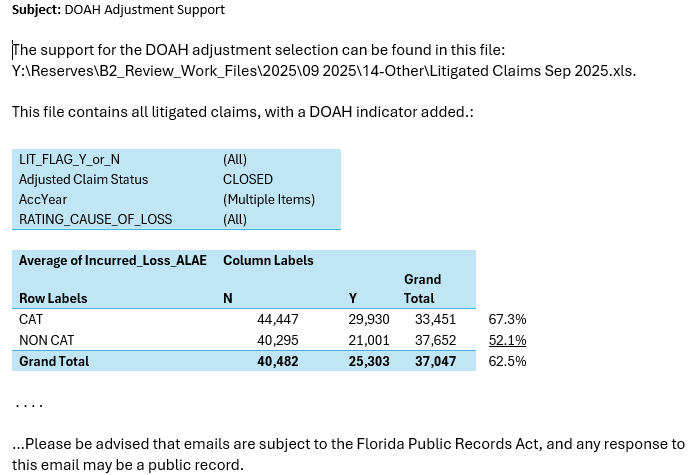Citizens Property Insurance Corporation keeps insisting that its use of the Division of Administrative Hearings (DOAH) arbitration system is designed to benefit policyholders by speeding up claim resolution and avoiding courtroom delays. But internal data I recently reviewed tells a different story. Citizens claims managers are focused on cutting Citizens’ own costs, not helping homeowners recover faster or more fully.
The internal figures compare litigated claims that went through DOAH with those that did not. The key metric used was labeled “Incurred Loss ALAE.” In insurance accounting, “ALAE” stands for Allocated Loss Adjustment Expenses. These costs are the direct, claim-specific costs of handling and defending an individual file. Think of payments to defense attorneys, expert witnesses, engineers, or independent adjusters. These are expenses of the dispute, not the indemnity dollars actually paid to the policyholder for their loss.
The data showed that for catastrophe claims, the average ALAE on DOAH cases was about 67 percent of what Citizens spent on comparable non-DOAH cases. For non-catastrophe claims, it dropped even further to about 52 percent. In other words, DOAH claims cost Citizens roughly a third to a half less to litigate.
That’s not evidence that policyholders are being helped. Instead, it’s evidence that Citizens is saving money by steering disputed claims into a process it created and controls. It is also evidence that the Citizens claims executives are merely building a business model case for DOAH’s use. The insurer’s internal records even referred to this analysis as “support for the DOAH adjustment selection.” This is a telling phrase that frames DOAH not as a fairness initiative but as a cost-reduction tool to save Citizens money rather than take care of its policyholders through full and prompt payment.
The deeper concern is what’s missing from the data: it doesn’t show indemnity, the actual payments to policyholders for their losses. If Citizens is systematically resolving claims in DOAH for less expense and less indemnity, then it’s fair to question whether the “savings” represent justice or just less money in the hands of those who suffered losses.
Citizens wants lawmakers and the public to believe that DOAH arbitration is an efficient, consumer-friendly alternative to litigation. But its own accounting focus gives away the real motive: this is about lowering Citizens’ expenditures, not delivering fairer results. It’s an insurer-driven system, and the data show it’s working for Citizens Property Insurance Company, but not for Florida citizens who find themselves insured through that entity.
Policyholders deserve more than a government-run insurance company tracking its success by how much less it spends contesting their claims. They deserve transparency, accountability, and a dispute process that measures fairness rather than financial efficiency.
I have previously criticized DOAH in Florida’s DOAH Arbitration Disaster: How the Legislature Gave Citizens a License to Steamroll, Policyholders, and Judge Slams Door on Citizens’ Arbitration Scheme. It does not take a rocket scientist to figure out that Citizens has duped Florida politicians into an “efficient alternative dispute resolution system” when the internal records show they are measuring how much money it saves by underpaying policyholders and at less cost. Journalists, legislators, and insurance regulators should be asking for all of these internal management memos that underlie the real motives for DOAH’s existence.
Thought for the Day
“If we are to keep our democracy, there must be one commandment: Thou shalt not ration justice.”
— Judge Learned Hand

